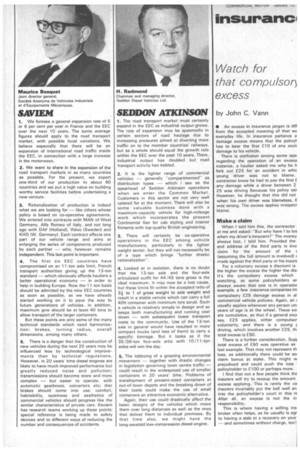Watch for that co rnpulsoo excess
Page 34

If you've noticed an error in this article please click here to report it so we can fix it.
by John C. Vann
• An excess in insurance jargon is cliff from the accepted meaning of that wc everyday life. In insurance parlance a damage excess means that the policy has to bear the first £10 of any accic damage to his vehicle.
There is confusion among some opei regarding the operation of an excess instance, a haulier asked me why he h fork out £25 for an accident in whir young driver was not to blame. contractor knew he had to pay the first £ any damage while a driver between 2 25 was driving (because his policy saii However, he thought that this did not when his own driver was blameless. E was wrong. The excess applies irrespeci blame.
Make a claim
When I told him this, the contractor at me and asked: "But why have Ito los when my driver's innocent?" The money always lost, I told him. Provided the and address of the third party is kno claim for the amount of the (assuming the full amount is involved) c made against the third party or his insure For a voluntary excess a discount is the higher the excess the higher the diei Ifs the compulsory excess which watching, as some policyholders an always aware that one is in operatic' example, a few insurance companies irn compulsory £25 damage excess in al commercial vehicle policies. Again, an usually applies whenever any person um years of age is at the wheel. These exi are cumulative, so that if a general exc( say, £25 applies, either compulsor voluntarily, and there is a young r driving, which involves another £25, th total excess is £50.
There is a further consideration. Supi total excess of £50 was operative as last example. That may not represent th loss, as additionally there could be so' claim bonus at stake. This might w prejudiced and could push the loss • policyholder to £100 or perhaps more.
I find that not a few people think the insurers will try to recoup the amount excess applying. This is rarely the ca insurers invariably put the ball well an into the policyholder's court in this re After all, an excess is not the in responsibility.
This is where having a willing ins broker often helps, as he usually is agr to having a stab at a recovery on your — and sometimes without charge, too!








































































































